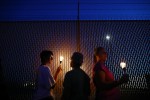Have Citizenship Processes Been Delayed Prior to the Elections Due to Trump Policies?

A resident waits in line to vote at a polling place at Riverside University High School on April 07, 2020 in Milwaukee, Wisconsin. Photo by Scott Olson/Getty Images
Naturalization interviews and ceremonies have come to a halt preventing ten of thousands of immigrants from becoming U.S. citizens. The reason? The Trump administration policies and U.S. Citizenship and Immigration Services (USCIS) offices are closed.
A study by Boundless Immigration—a tech company whose mission is to help immigrants secure citizenship and green cards—reports that On March 18, 2020 USCIS stopped citizenship processes due to the coronavirus pandemic. According to Forbes, this delay has already left well over 100,000 future Americans in limbo.
Now, would-be citizens must wait, perhaps indefinitely, before they can become citizens and gain the right to vote in the 2020 election. “If USCIS does not resume interviews and oath ceremonies using remote methods appropriate for the present emergency, the number of disenfranchised citizens-in-waiting will continue to pile up,” the study says decidedly.
At this pace, “2,100 immigrants will run out of time to vote each day,” and the number will only increase as offices remain closed during the pandemic. Therefore, one has to wonder if the slowing down of the naturalization process is a move by the Trump administration to stop immigrants from voting in the 2020 election. Because, as Doug Rand, co-founder and president of Boundless Immigration, points out, the problem can easily be solved by continuing the process virtually.

“People who need to complete their naturalization interviews are no different from people who take online proctored exams, which was already happening millions of times long before COVID-19,” Rand told Forbes. “The entire country is making do with video conferencing right now, why can’t USCIS?”
Immigration attorney Greg Siskind adds that “there is nothing that says the interviews or the oath ceremonies need to happen in person.” He references two relevant parts of the Immigration and Nationality Act that back up such statement, such as 332(a) [1443(a)] on “Rules and regulations governing examination of applicants” and 332(d) [1443(d)] on “Administration of oaths and depositions.”
According to USCIS, there are currently over 649,000 pending applications for naturalization and, considering what we’ve seen from the Trump administration in the past and the pace of the naturalization process as is, are we the only ones fearful that that number will rise and prevent new, potential U.S. citizens from voting?